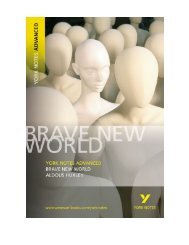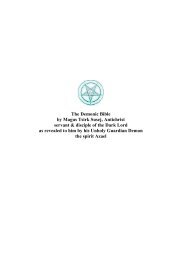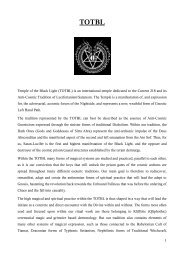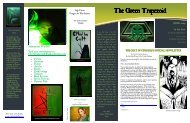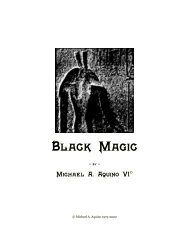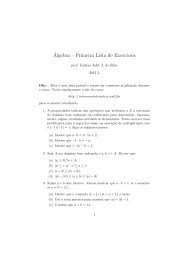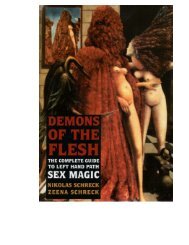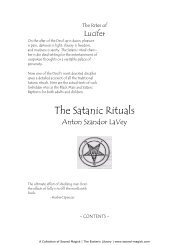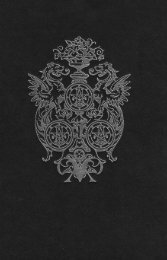Satanism Today - An Encyclopedia of Religion, Folklore and Popular ...
Satanism Today - An Encyclopedia of Religion, Folklore and Popular ...
Satanism Today - An Encyclopedia of Religion, Folklore and Popular ...
Create successful ePaper yourself
Turn your PDF publications into a flip-book with our unique Google optimized e-Paper software.
Appendix II: 1992 FBI Study <strong>of</strong> Satanic Ritual Abuse 317<br />
size Certainly not the need for drug treatment centers;<br />
there was no evaluation <strong>of</strong> the pros <strong>and</strong> cons <strong>of</strong><br />
America’s juvenile justice system, no investigation <strong>of</strong> the<br />
schools, no inquiry into how to prevent family violence,<br />
no discussion <strong>of</strong> the effects <strong>of</strong> unemployment on a family.<br />
Instead our attention was mesmerized by an attempt<br />
to count the number <strong>of</strong> subliminal demons that can<br />
dance on the end <strong>of</strong> a record needle(p.1).<br />
The law enforcement investigator must objectively<br />
evaluate the legal significance <strong>of</strong> any criminal’s spiritual<br />
beliefs. In most cases, including those involving<br />
satanists, it will have little or no legal significance. If a<br />
crime is committed as part <strong>of</strong> a spiritual belief system, it<br />
should make no difference which belief system it is. The<br />
crime is the same whether a child is abused or murdered<br />
as part <strong>of</strong> a Christian, Hare Krishna, Muslim, or any<br />
other belief system. We generally don’t label crimes with<br />
the name <strong>of</strong> the perpetrator’s religion. Why then are the<br />
crimes <strong>of</strong> child molesters, rapists, sadists, <strong>and</strong> murderers<br />
who happen to be involved in satanism <strong>and</strong> the occult<br />
labeled as satanic or occult crimes If criminals use a<br />
spiritual belief system to rationalize <strong>and</strong> justify or to<br />
facilitate <strong>and</strong> enhance their criminal activity, should the<br />
focus <strong>of</strong> law enforcement be on the belief system or on<br />
the criminal activity<br />
Several documented murders have been committed<br />
by individuals involved in one way or another in<br />
satanism or the occult. In some <strong>of</strong> these murders the perpetrator<br />
has even introduced elements <strong>of</strong> the occult (e.g.,<br />
satanic symbols at crime scene). Does that automatically<br />
make these satanic murders It is my opinion that the<br />
answer is no. Ritualistic murders committed by serial<br />
killers or sexual sadists are not necessarily satanic or<br />
occult murders. Ritualistic murders committed by psychotic<br />
killers who hear the voice <strong>of</strong> Satan are no more<br />
satanic murders than murders committed by psychotic<br />
killers who hear the voice <strong>of</strong> Jesus are Christian murders.<br />
Rather a satanic murder should be defined as one committed<br />
by two or more individuals who rationally plan<br />
the crime <strong>and</strong> whose primary motivation is to fulfill a<br />
prescribed satanic ritual calling for the murder. By this<br />
definition I have been unable to identify even one documented<br />
satanic murder in the United States. Although<br />
such murders may have <strong>and</strong> can occur, they appear to be<br />
few in number. In addition the commission <strong>of</strong> such<br />
killings would probably be the beginning <strong>of</strong> the end for<br />
such a group. It is highly unlikely that they could continue<br />
to kill several people, every year, year after year, <strong>and</strong><br />
not be discovered.<br />
A brief typology <strong>of</strong> satanic <strong>and</strong> occult practitioners is<br />
helpful in evaluating what relationship, if any, such practices<br />
have to crimes under investigation. The following<br />
typology is adapted from the investigative experience <strong>of</strong><br />
Officer S<strong>and</strong>i Gallant <strong>of</strong> the San Francisco Police<br />
Department, who began to study the criminal aspects <strong>of</strong><br />
occult activity long before it became popular. No typology<br />
is perfect, but I use this typology because it is simple<br />
<strong>and</strong> <strong>of</strong>fers investigative insights. Most practitioners fall<br />
into one <strong>of</strong> three categories, any <strong>of</strong> which can be practiced<br />
alone or in groups:<br />
“Youth Subculture”<br />
Most teenagers involved in fantasy role-playing<br />
games, heavy metal music, or satanism <strong>and</strong> the<br />
occult are going through a stage <strong>of</strong> adolescent development<br />
<strong>and</strong> commit no significant crimes. The<br />
teenagers who have more serious problems are usually<br />
those from dysfunctional families or those who<br />
have poor communication within their families.<br />
These troubled teenagers turn to satanism <strong>and</strong> the<br />
occult to overcome a sense <strong>of</strong> alienation, to rebel, to<br />
obtain power, or to justify their antisocial behavior.<br />
For these teenagers it is the symbolism, not the spirituality,<br />
that is more important. It is either the psychopathic<br />
or the oddball, loner teenager who is most<br />
likely to get into serious trouble. Extreme involvement<br />
in the occult is a symptom <strong>of</strong> a problem, not<br />
the cause. This is not to deny, however, that satanism<br />
<strong>and</strong> the occult can be negative influences for a troubled<br />
teenager. But to hysterically warn teenagers to<br />
avoid this “mysterious, powerful <strong>and</strong> dangerous”<br />
thing called satanism will drive more teenagers right<br />
to it. Some rebellious teenagers will do whatever will<br />
most shock <strong>and</strong> outrage society in order to flaunt<br />
their rejection <strong>of</strong> adult norms.<br />
“Dabblers” (Self-Styled)<br />
For these practitioners there is little or no spiritual<br />
motivation. They may mix satanism, witchcraft,<br />
paganism, <strong>and</strong> any aspects <strong>of</strong> the occult to suit their<br />
purposes. Symbols mean whatever they want them<br />
or believe them to mean. Molesters, rapists, drug<br />
dealers, <strong>and</strong> murderers may dabble in the occult <strong>and</strong><br />
may even commit their crimes in a ceremonial or ritualistic<br />
way. This category has the potential to be the<br />
most dangerous, <strong>and</strong> most <strong>of</strong> the “satanic” killers fall<br />
into this category. Their involvement in satanism <strong>and</strong><br />
the occult is a symptom <strong>of</strong> a problem, <strong>and</strong> a rationalization<br />
<strong>and</strong> justification <strong>of</strong> antisocial behavior.<br />
Satanic/occult practices (as well as those <strong>of</strong> other<br />
spiritual belief systems) can also be used as a mechanism<br />
to facilitate criminal objectives.<br />
“Traditional” (Orthodox)<br />
These are the so-called true believers. They are <strong>of</strong>ten<br />
wary <strong>of</strong> outsiders. Because <strong>of</strong> this <strong>and</strong> constitutional<br />
issues, such groups are difficult for law enforcement<br />
to penetrate. Although there may be much we don’t<br />
know about these groups, as <strong>of</strong> now there is little or<br />
no hard evidence that as a group they are involved in<br />
serious, organized criminal activity. In addition,<br />
instead <strong>of</strong> being self-perpetuating master crime con-



